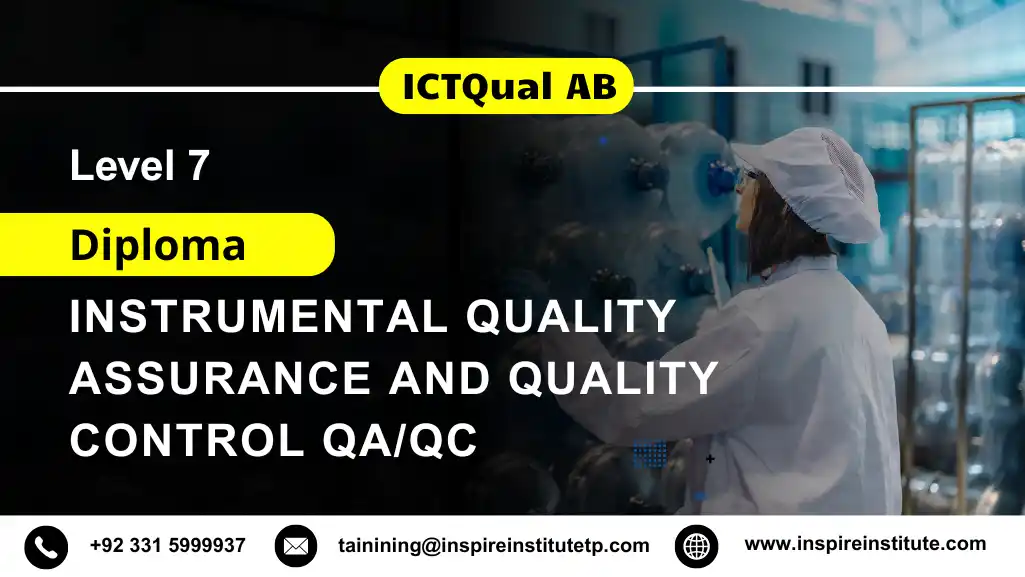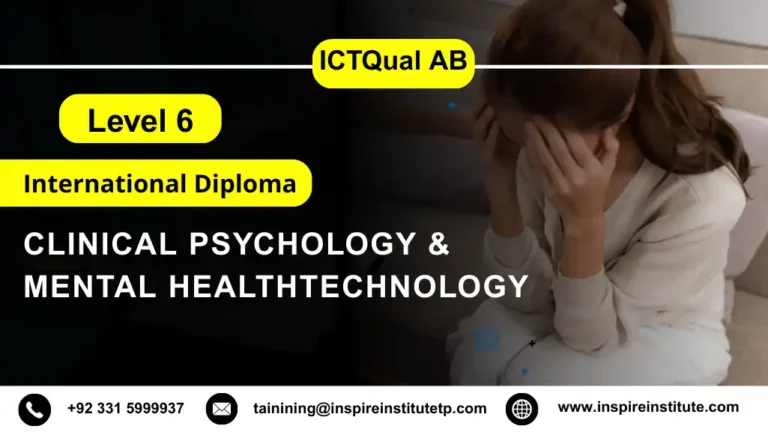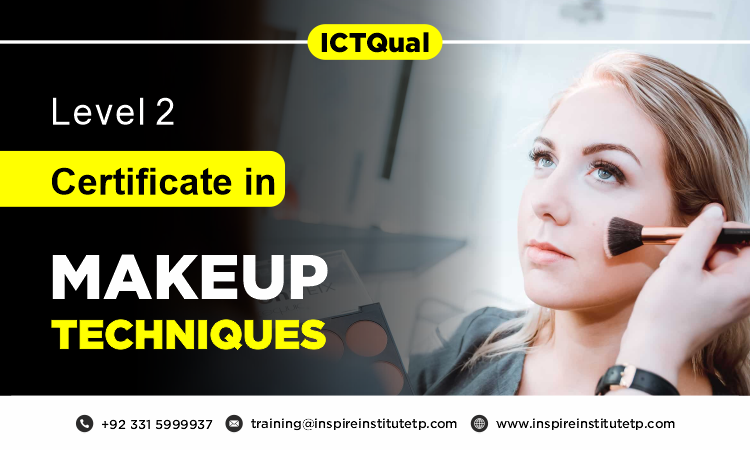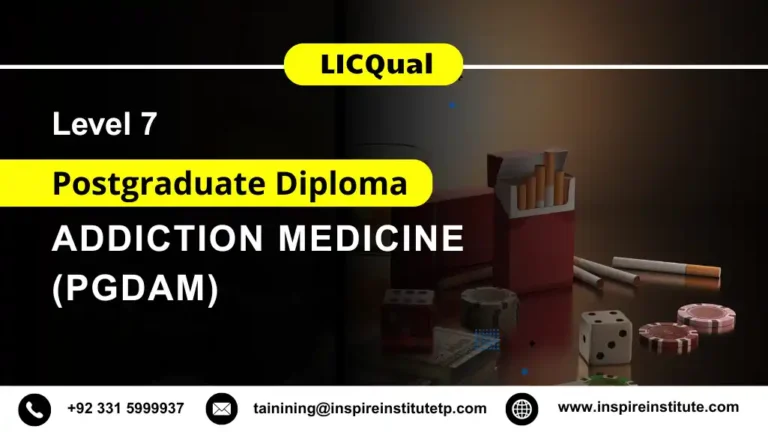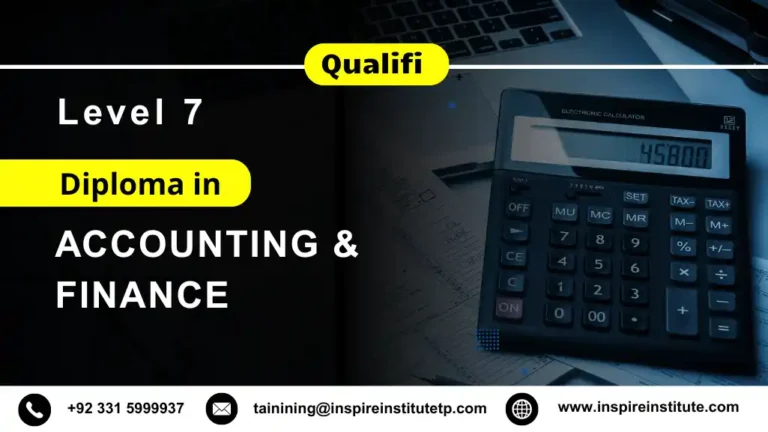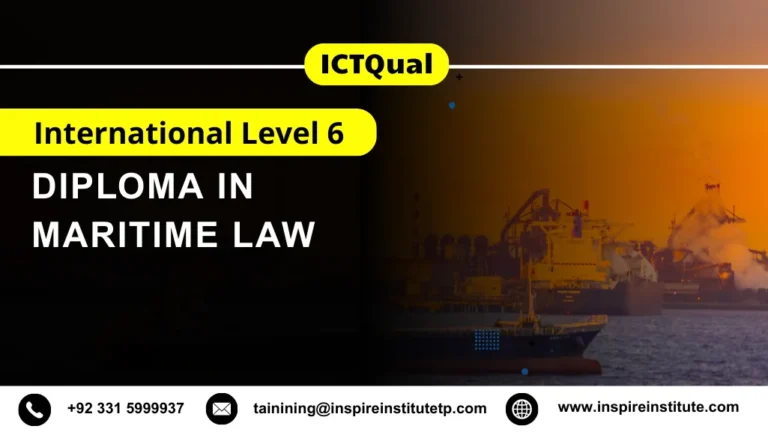ICTQual AB Level 7 Diploma in Instrumental Quality Assurance and Quality Control QA/QC
The ICTQual AB Level 7 Diploma in Instrumental Quality Assurance and Quality Control (QA/QC) is a prestigious, advanced qualification designed for professionals seeking to lead and innovate in quality management systems. This Level 7 diploma Quality Assurance and Quality Control focuses on instrumental QA/QC, strategic quality leadership, regulatory compliance, and advanced process control, preparing learners to make impactful contributions in industries such as pharmaceuticals, manufacturing, food safety, and engineering.
The purpose of this diploma is to provide learners with an in-depth understanding of advanced QA/QC principles, instrumental analysis, and quality management strategies. The course covers essential topics such as statistical process control, calibration and validation, audit planning, risk assessment, and compliance with ISO and IEC standards. By blending theoretical frameworks with applied methodologies, the program equips learners to manage and optimize complex quality assurance systems while ensuring operational excellence.
Learners will acquire specialized skills in instrumental QA/QC training, advanced data integrity, and method validation. They will also gain practical expertise in analytical instrumentation, calibration and performance verification, and quality systems auditing. These competencies enable professionals to design and implement robust QA/QC programs that meet international standards and enhance organizational reliability.
Why Choose this Qualification
The ICTQual AB Level 7 Diploma in Instrumental Quality Assurance and Quality Control (QA/QC) is a globally recognised and advanced professional qualification designed for individuals who aspire to lead in quality management, compliance, and industrial process optimisation. This diploma Quality Assurance and Quality Control equips learners with strategic, analytical, and technical expertise required to oversee complex QA/QC systems, implement international standards, and drive operational excellence across industries. It is ideal for professionals seeking measurable career progression, technical mastery, and leadership in QA/QC environments.
Key Reasons to Choose This Qualification
Globally Recognized and Industry-Aligned Qualification
- Developed in alignment with international QA/QC standards, ensuring global relevance and credibility.
- Recognised by employers in sectors such as pharmaceuticals, manufacturing, oil & gas, and food processing.
- Enhances career mobility by validating advanced instrumental QA/QC skills.
- Provides a qualification that meets regulatory and compliance requirements across multiple industries.
- Strengthens professional credibility and positions learners as experts in QA/QC systems Quality Assurance and Quality Control .
Advanced Knowledge in Instrumental QA/QC Systems
- Covers strategic quality management, audit planning, and risk assessment.
- Provides in-depth understanding of calibration, validation, and analytical instrumentation.
- Equips learners to design, implement, and monitor comprehensive QA/QC programs.
- Develops the ability to analyse and improve industrial processes for optimal quality.
- Ensures mastery of international quality standards such as ISO 9001, ISO 17025, and IEC frameworks.
Practical, Hands-On Experience
- Includes applied projects, laboratory simulations, and real-world case studies.
- Trains learners to troubleshoot instrumentation and validate quality control processes.
- Strengthens skills in data interpretation, performance verification, and process monitoring.
- Develops competence in implementing corrective and preventive actions (CAPA).
- Bridges theoretical knowledge with practical industrial application for measurable outcomes.
Development of Analytical and Technical Skills
- Enhances expertise in statistical process control and quality metrics analysis.
- Provides problem-solving skills to address deviations and optimise operations.
- Trains learners to maintain data integrity and ensure accurate reporting.
- Builds the ability to assess and improve process efficiency through quantitative analysis.
- Equips participants to implement continuous improvement initiatives in QA/QC environments.
Leadership and Management Competence
- Prepares learners to lead QA/QC teams and manage cross-functional departments.
- Develops skills in decision-making, communication, and strategic planning.
- Teaches principles of quality leadership and organisational governance.
- Equips learners to coordinate audits, inspections, and regulatory compliance activities.
- Strengthens ability to drive quality initiatives aligned with corporate objectives.
Focus on Compliance and Risk Management
- Covers global regulatory standards and compliance frameworks.
- Trains learners to implement risk assessment and mitigation strategies.
- Enhances ability to maintain operational and process integrity.
- Develops skills to ensure adherence to Good Laboratory Practices (GLP) and Good Manufacturing Practices (GMP).
- Prepares learners to conduct thorough internal audits and support external inspections Quality Assurance and Quality Control .
Career Advancement and Professional Growth
- Opens opportunities for senior QA/QC, compliance, and managerial roles.
- Strengthens employability in international markets where QA/QC expertise is in high demand.
- Positions learners to transition into consultancy, auditing, or strategic leadership roles.
- Provides recognition of advanced technical and managerial competence.
- Builds confidence to contribute effectively to Quality Assurance and Quality Control organisational quality strategy and innovation.
Flexible Learning and Continuous Professional Development
- Designed for working professionals seeking career progression without interrupting employment.
- Supports assignment-based learning, self-paced study, and practical skill application.
- Encourages critical thinking, independent research, and applied knowledge transfer.
- Integrates theory with industry practice for measurable performance improvements.
- Prepares learners for ongoing professional development and lifelong learning in QA/QC.
The ICTQual AB Level 7 Diploma in Instrumental Quality Assurance and Quality Control (QA/QC) provides a transformative learning experience that combines advanced technical knowledge, leadership, and practical expertise. By completing this qualification, Quality Assurance and Quality Control learners gain internationally recognised credentials, measurable skills, and the confidence to excel in senior QA/QC roles, driving operational excellence and continuous improvement across global industries.easurable improvement in industrial performance and global recognition as a quality professional.
Course Overview
UK based Qualification
Study Units: 6 Units
Evidence & Assignment Based
Course Level: Level 7
Qualification Structure
This qualification, the ICTQual AB Level 7 Diploma in Instrumental Quality Assurance and Quality Control QA/QC, consists of 6 mandatory units.
- Designing and Auditing ITPs for International QA/QC Projects
- Global Best Practices in Inspection Checklists and Compliance Frameworks
- Strategic Material Management, Preservation, and Supply Chain QA/QC
- Comparative Analysis of NEC, NEMA, and Aramco Standards in Instrumentation Projects
- Advanced Instrumentation Systems – Tubing, Junction Boxes, Cabinets, and Process Elements under International Standards
- Leadership in Loop Checking, Testing, and Commissioning – Managing Global Projects
Who Should Take This Course
The ICTQual AB Level 7 Diploma in Instrumental Quality Assurance and Quality Control (QA/QC) is a high-level professional qualification designed for experienced individuals seeking advanced expertise in QA/QC systems, instrumentation, and strategic quality management. This course Quality Assurance and Quality Control is ideal for professionals aiming to assume leadership roles, manage complex quality processes, and implement international quality standards across industrial, laboratory, and manufacturing environments. The program equips learners with measurable technical, analytical, and managerial skills necessary to excel in global QA/QC operations.
This Course is Suitable for
Senior QA/QC Professionals
- Enhance leadership capabilities to manage QA/QC departments and multidisciplinary teams.
- Apply advanced quality management strategies in compliance with ISO and IEC standards.
- Develop skills in audit planning, risk assessment, and corrective action implementation.
- Strengthen proficiency in instrumental analysis, process control, and data integrity Quality Assurance and Quality Control .
- Prepare for strategic decision-making roles in quality management systems.
Laboratory Managers and Technical Supervisors
- Gain expertise in advanced calibration, validation, and laboratory instrumentation techniques.
- Implement robust quality assurance and quality control procedures across laboratory operations.
- Develop the ability to oversee complex testing and inspection processes.
- Improve analytical reporting accuracy and maintain compliance with global standards.
- Build competence in process improvement and operational efficiency strategies Quality Assurance and Quality Control .
Industrial Engineers and Process Managers
- Acquire advanced knowledge of QA/QC integration in manufacturing and industrial systems.
- Apply Lean Six Sigma methodologies to optimize production and quality performance.
- Monitor and evaluate process efficiency using statistical process control techniques.
- Develop risk mitigation strategies to ensure operational reliability.
- Strengthen capability to implement quality systems aligned with international benchmarks.
Compliance Officers and Regulatory Specialists
- Understand global regulatory requirements and ensure organisational compliance.
- Develop expertise in ISO standards, GMP, GLP, and audit readiness.
- Conduct thorough inspections and internal audits with measurable outcomes.
- Implement risk management and corrective action strategies effectively.
- Enhance professional credibility and prepare for senior compliance roles.
Research and Development Professionals
- Gain advanced skills in method development, validation, and instrumental analysis.
- Ensure reproducibility and reliability of experimental data in R&D projects.
- Integrate QA/QC practices into product development and testing.
- Develop capacity for analytical problem-solving and process optimisation.
- Build competence in regulatory compliance for innovative industrial solutions.
Technical Consultants and Auditors
- Provide expert guidance on QA/QC systems and instrumental quality management.
- Conduct external audits and offer actionable recommendations to clients.
- Evaluate quality processes against international standards with measurable precision.
- Enhance professional skills in reporting, compliance, and process improvement.
- Support organisations in achieving operational excellence and quality certification.
Senior Managers and Leaders in Quality
- Lead strategic QA/QC initiatives and quality improvement projects.
- Develop organisational policies and standard operating procedures aligned with international standards.
- Enhance decision-making, communication, and leadership in quality-focused teams.
- Drive continuous improvement and ensure measurable operational impact.
- Prepare for executive roles in quality assurance, process management, and compliance.
Aspiring Professionals with Prior QA/QC Experience
- Build advanced technical and managerial competencies for career progression.
- Gain internationally recognised credentials to enhance employability and professional growth.
- Apply theoretical knowledge to practical, measurable industrial and laboratory scenarios.
- Develop analytical, leadership, and problem-solving skills for QA/QC environments.
- Prepare for senior positions and specialised consultancy roles in global industries.
The ICTQual AB Level 7 Diploma in Instrumental Quality Assurance and Quality Control (QA/QC) is suitable for a diverse range of professionals who seek advanced expertise, leadership skills, and practical competencies in QA/QC. By completing this qualification Quality Assurance and Quality Control , learners are empowered to take on senior-level responsibilities, implement international quality standards, and make measurable contributions to operational excellence and compliance across industries worldwide.
Course Benefits
TThe ICTQual AB Level 7 Diploma in Instrumental Quality Assurance and Quality Control (QA/QC) is an advanced, internationally recognised qualification designed for senior professionals aiming to excel in industrial quality management, advanced instrumentation, and strategic QA/QC leadership. This diploma Quality Assurance and Quality Control deepens learners’ expertise in global QA/QC systems, regulatory compliance, and sophisticated process control methodologies. It enables participants to assume strategic responsibilities, ensuring operational precision, reliability, and compliance across complex industrial and laboratory environments. Ideal for experienced QA/QC professionals, technical managers, and aspiring industry leaders, this qualification combines theoretical rigour with hands-on application to develop the skills needed to lead innovation in quality assurance and control.
Key Benefits of the Course
Specialist Knowledge
- Covers advanced QA/QC frameworks, process optimisation, and performance evaluation aligned with global standards.
- Equips learners to implement strategic quality assurance methodologies in accordance with ISO 9001, ISO 17025, and IEC regulations.
- Develops expertise in leading audits, risk management, and compliance in multi-industry settings.
- Enhances the ability to design, analyse, and improve complex quality processes.
- Prepares learners to align quality systems with corporate and international operational objectives Quality Assurance and Quality Control
Practical Application
- Trains learners to conduct comprehensive inspections, calibration audits, and performance analyses.
- Develops skills in documentation, compliance, and corrective/preventive actions (CAPA).
- Provides practical expertise in instrumental QA/QC and statistical process control.
- Encourages problem-solving and process assessment to enhance operational efficiency.
- Bridges theory with measurable industrial applications for high-level performance improvements.
Recognised Qualification
- Respected by employers across manufacturing, oil & gas, pharmaceuticals, construction, and automation sectors.
- Demonstrates advanced QA/QC proficiency and leadership potential.
- Enhances professional credibility and opens international career opportunities.
- Validates expertise in strategic QA/QC management and compliance with global standards.
- Positions graduates for senior leadership, consultancy, and advisory roles.
Flexible Learning Pathway
- Self-paced structure accommodates full-time professionals and students.
- Integrates academic study with practical professional experience.
- Provides expert tutor support and access to digital learning resources.
- Encourages critical thinking, independent evaluation, and applied workplace knowledge transfer.
- Ensures learners can achieve measurable outcomes without disrupting professional commitments.
Evidence-Based Training
- Enhances interpretation of quality data and identification of deviations.
- Builds competence in implementing corrective actions to improve system integrity.
- Develops advanced skills in both qualitative and quantitative process evaluation.
- Ensures continuous improvement strategies are applied according to international standards.
- Strengthens the ability to maintain compliance, precision, and reliability in complex systems.
Career Development
- Roles include Senior QA/QC Manager, Quality Systems Director, Compliance Officer, and Process Improvement Specialist.
- Prepares learners to handle high-level responsibilities in auditing, process validation, and team leadership.
- Provides pathways to higher-level professional qualifications or doctoral research in QA/QC.
- Enhances employability and global career prospects.
- Builds capability to influence organisational quality strategy and operational excellence.
Enhanced Operational Impact
- Develops understanding of operational efficiency, reliability, and risk management.
- Equips graduates to identify potential process risks and apply sustainable corrective measures.
- Enhances productivity, compliance, and quality performance across industrial operations.
- Strengthens capacity to introduce measurable process improvements.
- Prepares learners to achieve significant impact in organisational quality outcomes.
Professional Growth
- Builds confidence in managing multidisciplinary QA/QC operations.
- Develops critical thinking for strategic problem-solving.
- Encourages lifelong learning and adaptability to evolving technologies.
- Strengthens decision-making, teamwork, and managerial capabilities.
- Positions graduates as influential leaders in industrial quality management.
The ICTQual AB Level 7 Diploma in Instrumental Quality Assurance and Quality Control (QA/QC) represents the pinnacle of professional development in QA/QC. It equips learners with advanced technical knowledge, leadership skills, and practical expertise required to implement international quality standards, drive innovation, and make measurable contributions to operational excellence in global industries.nisations while advancing their careers in the dynamic field of QA/QC.
Eligibility Criteria
The ICTQual AB Level 7 Diploma in Instrumental Quality Assurance and Quality Control (QA/QC) is designed for experienced professionals seeking advanced expertise in industrial quality management, instrumentation, and strategic QA/QC leadership. This qualification is ideal for learners with prior education or experience in QA/QC, engineering, or industrial operations who aim to progress into senior management, consultancy, or executive roles.
Age Requirements
Applicants must be at least 22 years old at the time of enrolment. This ensures learners have the maturity and professional awareness required to engage effectively with the advanced technical, analytical, and leadership content of the qualification.
Educational Requirements
Learners should have completed a Level 6 qualification or an equivalent diploma in related disciplines such as Instrumentation, Engineering, Quality Control, or Industrial Technology. Holding the ICTQual AB Level 6 Diploma in Instrumental QA/QC provides a strong foundation for this advanced Level 7 course.
Professional Experience
While not mandatory, relevant professional experience in industries such as oil and gas, manufacturing, power generation, construction, or automation is highly recommended. Experience in QA/QC, inspection, or instrumentation roles enhances understanding of the practical applications and strategic aspects of quality management taught in this diploma.
English Language Proficiency
Since the course is delivered in English, learners must have a strong command of written and spoken English. Non-native speakers should demonstrate proficiency through IELTS (minimum score of 6.0) or equivalent, or through prior education and work experience in an English-speaking professional environment. This ensures effective engagement with coursework, assessments, and industry-focused projects.
The ICTQual AB Level 7 Diploma in Instrumental Quality Assurance and Quality Control (QA/QC) equips learners with senior-level technical knowledge, strategic skills, and practical expertise to lead QA/QC operations, drive compliance, and implement international quality standards in complex industrial environments.
Future Progression
The ICTQual AB Level 7 Diploma in Instrumental Quality Assurance and Quality Control (QA/QC) provides learners with advanced technical knowledge, strategic leadership skills, and professional expertise required to manage complex QA/QC systems at the highest levels. This qualification not only validates a professional’s capability to lead, design, and oversee industrial quality processes but also serves as a foundation for continuous professional development, executive-level roles, and global career advancement. Graduates are equipped to implement international quality standards, optimise industrial processes, and drive measurable organisational improvements.
Academic Progression
Learners who complete this Level 7 Diploma can progress to executive education programmes, doctoral-level research, or specialised professional certifications in areas such as industrial quality systems, advanced instrumentation, and operational management. These advanced pathways expand expertise in strategic quality management, risk assessment, and regulatory compliance, supporting the transition from senior technical roles to leadership or consultancy positions within global industries.
Professional Career Opportunities
Graduates of the Level 7 Diploma are eligible for senior and executive-level positions across industrial, laboratory, and manufacturing sectors. Career roles include:
- Senior QA/QC Manager
- Quality Systems Director
- Compliance and Regulatory Officer
- Instrumentation and Calibration Consultant
- Process Improvement and Operational Excellence Lead
These roles enable professionals to oversee strategic QA/QC initiatives, manage complex inspection systems, and ensure organisational compliance with global standards.
Global Industry Recognition
The ICTQual AB Level 7 Diploma is internationally recognised, enabling graduates to operate confidently across industries including oil and gas, pharmaceuticals, manufacturing, construction, and process automation. The qualification validates advanced capabilities in QA/QC, demonstrating proficiency in ISO 9001, ISO 17025, IEC standards, and global best practices, thus enhancing professional credibility and international mobility.
Continuous Professional Development (CPD)
Graduates can further enhance their expertise through CPD programmes, short courses, and certifications in:
- ISO Lead Auditor Training (ISO 9001, ISO 14001, ISO 45001)
- Advanced Instrumentation and Industrial Control Systems
- Strategic Quality Management and Auditing Techniques
- Risk Management, Compliance, and Process Optimisation
These CPD opportunities ensure learners remain at the forefront of industry trends, regulatory changes, and technological innovations that shape modern QA/QC practices.
Pathway to Higher Qualifications and Leadership Roles
The Level 7 Diploma equips learners for senior leadership, executive roles, and strategic decision-making positions. It provides a platform for pursuing further academic achievements, including PhD research or specialised master’s programmes in quality systems, industrial management, and operational excellence. Graduates are prepared to influence organisational quality policies, implement continuous improvement strategies, and lead multidisciplinary teams in complex industrial environments.
The ICTQual AB Level 7 Diploma in Instrumental Quality Assurance and Quality Control (QA/QC) represents a pinnacle of professional development. It empowers learners to excel in high-level QA/QC roles, lead innovation in industrial systems, and implement globally recognised quality standards. This qualification strengthens technical expertise, strategic leadership, and operational impact, opening pathways to lifelong learning, executive careers, and international professional success.ognition as skilled professionals in the engineering and process control sectors.

